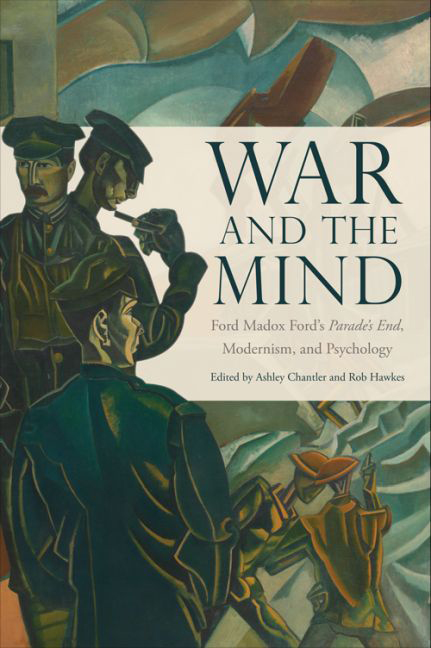Book contents
- Frontmatter
- Contents
- Acknowledgements
- Introduction
- 1 ‘Sex ferocity’ and ‘the sadic lusts of certain novelists’: Sexuality, Sadomasochism, and Suppression in Parade's End
- 2 Freud Madox Ford: Impressionism, Psychoanalytic Trauma Theory, and Ford's Wartime Writing
- 3 Empathy, Trauma, and the Space of War in Parade's End
- 4 Fellow Feeling in Ford's Last Post: Modernist Empathy and the Eighteenth-Century Man
- 5 The Self-Analysis of Christopher Tietjens
- 6 Composing the War and the Mind; Composing Parade's End
- 7 The Work of Sleep: Insomnia and Discipline in Ford and Sassoon
- 8 Representing Shell Shock: A Return to Ford and Rebecca West
- 9 ‘I hate soldiering’: Ford, May Sinclair, and War Heroism
- 10 Peace of Mind in Parade's End
- Notes on Contributors
- Bibliography
- Index
9 - ‘I hate soldiering’: Ford, May Sinclair, and War Heroism
Published online by Cambridge University Press: 15 September 2017
- Frontmatter
- Contents
- Acknowledgements
- Introduction
- 1 ‘Sex ferocity’ and ‘the sadic lusts of certain novelists’: Sexuality, Sadomasochism, and Suppression in Parade's End
- 2 Freud Madox Ford: Impressionism, Psychoanalytic Trauma Theory, and Ford's Wartime Writing
- 3 Empathy, Trauma, and the Space of War in Parade's End
- 4 Fellow Feeling in Ford's Last Post: Modernist Empathy and the Eighteenth-Century Man
- 5 The Self-Analysis of Christopher Tietjens
- 6 Composing the War and the Mind; Composing Parade's End
- 7 The Work of Sleep: Insomnia and Discipline in Ford and Sassoon
- 8 Representing Shell Shock: A Return to Ford and Rebecca West
- 9 ‘I hate soldiering’: Ford, May Sinclair, and War Heroism
- 10 Peace of Mind in Parade's End
- Notes on Contributors
- Bibliography
- Index
Summary
A friend of Ford and Violet Hunt, May Sinclair (1863–1946) enlisted in 1915 as the ‘Secretary and Reporter’ of an ambulance unit from the Medico-Psychological Clinic, which she had helped found two years earlier. Like Ford, she wrote extensively about the war and tried to depict the complexity of the soldier's experience. Her fictional and non-fictional works lay a similar emphasis on the psychological issues faced by soldiers involving shell shock, the influence of war on the relationships between genders, the return to civilian life, fear of and fascination with death, the anxiety of loss, and the difficulty of articulating pre-war, war and post-war times. Such perspectives seem at odds with traditional definitions of war heroism in literature. Several studies have shown how heroic discourses, ranging from Greek mythology to Arthurian romances or adventure stories, were embedded in Victorian life and literature, as they relied on empirical or historicised figures that were all associated with successful adventures and ‘a moral paradigm’. World War I heroism seems to challenge this diverse and complex heritage: the soldier is no longer ‘a man of superhuman strength, courage, or ability, favoured by the gods’ (OED). With Ford and Sinclair, war heroism becomes an adventure of the mind, of the self, its neuroses and its unconscious mechanisms. Tietjens, just like Sinclair's hero Tasker Jevons, seems driven, at least temporarily, by military duty, yet their heroic narratives are given minor importance. Ford ‘carefully avoid[s] the word “hero”’, and in Some Do Not … Tietjens describes war as the context for ‘the incidental degeneration of the heroic impulse’. This chapter argues that Ford's and Sinclair's depictions of war heroism are paradoxically constructed on their heroes’ fear and war neuroses, as well as on their relation to the civilian world. War heroism has thus become a complex matter that relies on the soldiers’ antecedents, on their thoughts, impressions and unconscious, rather than on their ‘heroic’ impulses.
- Type
- Chapter
- Information
- War and the MindFord Madox Ford's Parade's End, Modernism, and Psychology, pp. 142 - 158Publisher: Edinburgh University PressPrint publication year: 2015

